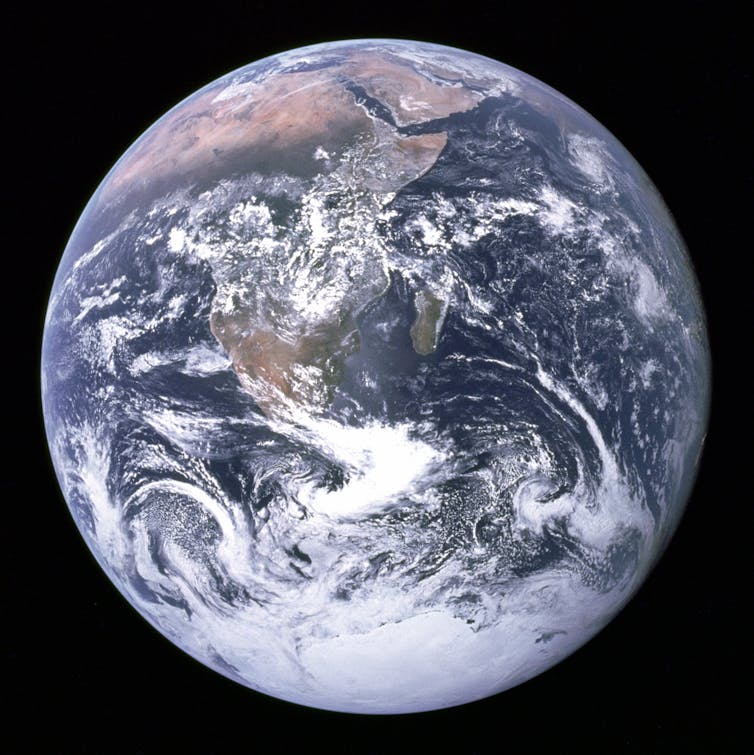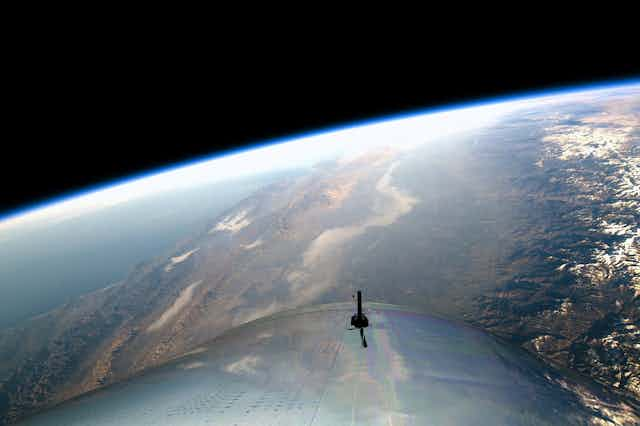Virgin Galactic, the space tourism company founded in 2004 by Richard Branson, promotes its flights as offering:
A Brand New Perspective: Deepen your connection to Earth and to humanity with the transformational experience known as the Overview Effect.
First discussed in 1987 by space philosopher Frank White, the Overview Effect is a result of viewing Earth from space.
Expressions of the effect range broadly. Astronauts might experience profound awe and wonder at the perception of Earth as a fragile living being. Some suffer crushing grief when considering the harm humans inflict on nature.
While Virgin Galactic promotes access to the Overview Effect as a major drawcard, it is a terrible irony that space tourism is enormously damaging for the environment.
Read more: Seeing Earth from space changes you – and you don't even have to leave the planet
The Overview Effect
The Overview Effect is not limited to astronauts from the West. Their Chinese and Russian counterparts have described the same profound connection to Earth when witnessing the planet from space.
As Soviet Russian cosmonaut Yuri Artyushkin reported:
The feeling of unity is not simply an observation. With it comes a strong sense of compassion and concern for the state of our planet and the effect humans are having on it. It isn’t important in which sea or lake you observe a slick of pollution, or in the forests of which country a fire breaks out, or on which continent a hurricane arises. You are standing guard over the whole of our Earth.
Until recently, researching the Overview Effect has required interviews with professional astronauts. Today, commercial space tourism is increasing awareness of the phenomenon, particularly when experienced by celebrities with large platforms.
In 2021, Star Trek actor William Shatner completed a suborbital flight with Jeff Bezos’ space tourism company Blue Origin. Shatner had anticipated emotions of celebration and joy when viewing “mother and Earth and comfort” from space. Instead, he later wrote, he struggled with “the strongest feelings of grief I have ever encountered”.
Shatner attributed his experience to the Overview Effect.

Space flight has a huge environmental impact
Virgin Galactic promotes the Overview Effect on its homepage as an experience exclusive to space flight.
However, access is extremely costly. While an eager space tourist consents to parting with US$450,000 to experience a profound connection with Earth, the planet itself has no say in receiving the massive pollution a single trip produces.
Rocket emissions impact Earth’s atmosphere, temperatures and the ozone layer at an unprecedented level. A 2022 study found space tourism produces black carbon particles that are almost 500 times more efficient at warming the atmosphere than all surface and airline sources of soot combined.
After being released into the upper atmosphere, the black carbon particles circulate for four to five years in a fine layer. This acts as a thin black umbrella absorbing solar radiation while blocking it from reaching Earth’s surface.
A 1.5-hour Virgin Galactic flight generates emissions equivalent to a ten-hour trans-Atlantic commercial air flight. However, the latter carries hundreds of passengers. With a passenger limit of six, a Virgin Galactic launch emits 4.5 tonnes of carbon per person. That’s more than twice the Paris Agreement’s recommended annual individual carbon budget.
Space tourism rocket launches don’t currently compare to commercial airline flights in number. But the suborbital transportation and space tourism market is expected to be worth US$2.58 billion by 2031. It’s growing at an annual rate of 17.15%.
Virgin Galactic is aiming to launch 400 space tourism flights every year.
Read more: Space tourism: rockets emit 100 times more CO₂ per passenger than flights – imagine a whole industry
Caring for Earth doesn’t depend on space flight
The desirability of the Overview Effect is not the overwhelming emotions experienced when witnessing Earth from space. As was evident in Shatner’s feelings of immense grief, these emotions are not always pleasant.
Instead, researchers, astronauts and space philosophers are interested in the spontaneous and powerful awareness that occurs. Astronauts’ accounts of the moment vary, but a consistent theme emerges: a connection to planet Earth that inspires environmental care.
Importantly, such clarity can be achieved without a suborbital space flight.
Frank White argues that, while viewing Earth from space produces the “ultimate” Overview Effect, it might also be had while looking at landscapes from a great height – such as a mountain range. Commercial pilots flying at high altitudes have experienced similar phenomena.
And for those considering a Virgin Galactic flight, there are no guarantees. Many astronauts with long careers report never experiencing the Overview Effect.

Read more: Keen to sign up for space tourism? Here are 6 things to consider (besides the price tag)
Environmental epiphanies happen on Earth
Spontaneous clarity about the importance of nature can occur while standing on solid ground. “Environmental epiphanies” are well documented and have no connection to specific religious or cultural beliefs.
Involving profound emotions and sudden awareness similar to the Overview Effect, environmental epiphanies can be accessed for free in mundane locations – such as reading a book at home.
And, like the Overview Effect, environmental epiphanies can lead to lasting change.
As space tourism continues to “take off”, misaligned marketing tactics like Virgin Galactic’s promotion of the Overview Effect must be scrutinised.
Being launched into space – and the massive pollution the process creates – isn’t necessary for us to want to sustain our Earth.

